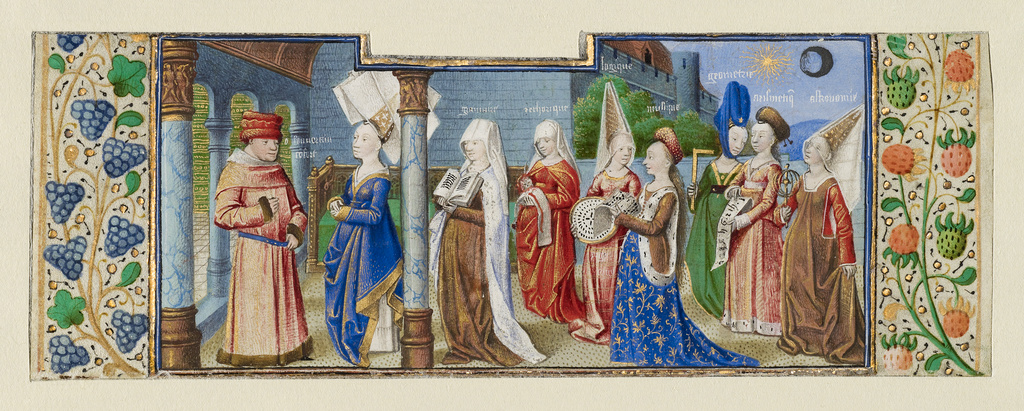Thursday, April 30th, 2020...5:20 pmChris Francese
Boethius, Consolation of Philosophy 1.P4

Philosophy Presenting the Seven Liberal Arts to Boethius. Coëtivy Master (French, active about 1450 – 1485). Source: Getty Museum
Ancius Manlius Severinus Boethius rose to high honors under Theodoric the Ostrogoth (ruler of the independent Ostrogothic Kingdom of Italy between 493–526), but fell from favor, was tried for treason, wrongly condemned and imprisoned at Ticinum (Pavia). Sentenced to death and to forfeiture of all his property, Boethius was executed by sword, probably in the autumn of 524. The Consolatio philosophiae, written from prison, discusses such fundamental existential questions as ‘What values are there?’, ‘What is the highest good?’, ‘What is the relationship between Providence and free will?’ With a regular switch between prose and poetry, a dialogue takes place with Philosophy, which appears to the condemned man in prison. In this passage Boethius puts the ideal of philosophical fortitude in the face of corrupt power in 18 lovely hendecasyllabic lines.
Quisquis composito serenus aevo
Fatum sub pedibus egit superbum
Fortunamque tuens utramque rectus
Invictum potuit tenere vultum,
Non illum rabies minaeque ponti
Versum funditus exagitantis aestum
Nec ruptis quotiens vagus caminis
Torquet fumificos Vesaeuus ignes
Aut celsas soliti ferire turres
Ardentis via fulminis movebit.
Quid tantum miseri saevos tyrannos
Mirantur sine viribus furentes?
Nec speres aliquid nec extimescas,
Exarmaveris impotentis iram.
At quisquis trepidus pavet vel optat,
Quod non sit stabilis suique iuris,
Abiecit clipeum locoque motus
Nectit qua valeat trahi catenam.
Podcast: Play in new window | Download
Subscribe: Apple Podcasts | RSS

Leave a Reply